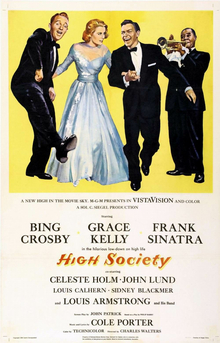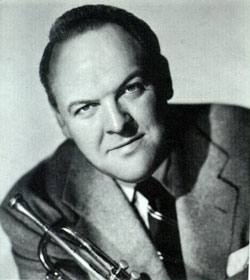
High Society is a 1956 American musical romantic comedy film directed by Charles Walters and starring Bing Crosby, Grace Kelly, and Frank Sinatra. The film was produced by Sol C. Siegel for Metro-Goldwyn-Mayer, and shot in VistaVision and Technicolor, with music and lyrics by Cole Porter.

Edward William May Jr. was an American composer, arranger and trumpeter. He composed film and television music for The Green Hornet (1966), The Mod Squad (1968), Batman, and Naked City (1960). He collaborated on films such as Pennies from Heaven (1981), and orchestrated Cocoon, and Cocoon: The Return, among others.
"Love and Marriage" is a 1955 song with lyrics by Sammy Cahn and music by Jimmy Van Heusen. It is published by Barton Music Corporation (ASCAP).
Gordon Hill Jenkins was an American arranger, composer, and pianist who was influential in popular music in the 1940s and 1950s. Jenkins worked with The Andrews Sisters, Johnny Cash, The Weavers, Frank Sinatra, Louis Armstrong, Judy Garland, Nat King Cole, Billie Holiday, Harry Nilsson, Peggy Lee and Ella Fitzgerald.

"True Love" is a popular song written by American songwriter Cole Porter, published in 1956. The song was introduced by Bing Crosby and Grace Kelly in the musical film High Society. "True Love" was nominated for the Academy Award for Best Original Song. Kelly's contribution on the record is relatively minor, duetting with Crosby on only the final chorus. Nonetheless, the single is co-credited to her.
"Little One" is a song written by Cole Porter for the 1956 film High Society, where it was introduced by Bing Crosby.

The Complete Capitol Singles Collection is a compact disc box set by the American singer Frank Sinatra, released on Capitol Records in 1996. The four-disc set contains all 45 singles released by Sinatra during his tenure at the label between 1953 and 1961. Of those, 25 made the Top 40 on the Billboard singles chart. It does not include releases specifically for jukeboxes or for extended play singles, with one exception. The original tapes were digitally remastered by Bob Norberg.
The Edsel Show is an hour-long television special broadcast live on CBS in the United States on October 13, 1957, intended to promote Ford Motor Company's new Edsel cars. It was a milestone in the long career of entertainer Bing Crosby and is notable as the first CBS entertainment program to be recorded on videotape for rebroadcast in the western part of the country following a live performance for the east coast. Crosby arranged for this ‘live’ program to be ‘produced’ by his alma mater Gonzaga University in order that the profits could go to them in a tax efficient way. The program won the ‘Look’ magazine TV Award for ‘Best Musical Show’ and was nominated for an Emmy as the “Best Single Program of the Year”.
"Pennies from Heaven" is a 1936 American popular song with music by Arthur Johnston and lyrics by Johnny Burke. It was introduced by Bing Crosby with Georgie Stoll and his Orchestra in the 1936 film of the same name.
"Makin' Whoopee" is a jazz/blues song, first popularized by Eddie Cantor in the 1928 musical Whoopee!. Gus Kahn wrote the lyrics and Walter Donaldson composed the music for the song as well as for the entire musical.

George Abel Van Eps was an American swing and mainstream jazz guitarist.

"The Nearness of You" is a popular song written in 1937 by Hoagy Carmichael with lyrics by Ned Washington. Intended for an unproduced Paramount film titled Romance In The Rough, the studio's publishing division Famous Music reregistered and published the song in 1940. It was first recorded by Chick Bullock and his Orchestra on Vocalion. Despite numerous accounts to the contrary, the song was never scheduled for and does not appear in the 1938 Paramount film Romance in the Dark.
"I Love You, Samantha" is a song written by Cole Porter for the 1956 film High Society, where it was introduced by Bing Crosby.
"Now You Has Jazz" is a song written by Cole Porter for the 1956 film High Society in which it was introduced by Bing Crosby and Louis Armstrong. The song describes what instruments are needed to create jazz.
"It's All Right with Me" is a popular song written by Cole Porter, for his 1953 musical Can-Can, where it was introduced by Peter Cookson as the character Judge Aristide Forestier.

Robin and the 7 Hoods is a 1964 12" vinyl LP album originally issued by Reprise as No. F-2021. Wrongly assumed to be a true soundtrack album of the film Robin and the 7 Hoods, it was advertised as "Original score from the motion picture musical comedy" which is correct. The film was made in November/December 1963 and the album was subsequently recorded at United Recording, Hollywood, in April 1964. The scene with Frank Sinatra's vocal of "I Like to Lead When I Dance" was dropped, so only the background instrumental can be heard in the film.

12 Songs of Christmas is a 1964 album of Christmas music by Frank Sinatra, Bing Crosby, and Fred Waring's Pennsylvanians. The singers previously collaborated on the album America, I Hear You Singing, which was released earlier the same year. The album was reissued as White Christmas on by WEA budget label Midi in 1973.
"I Can't Believe That You're in Love with Me" is a 1926 popular song composed by Jimmy McHugh, with lyrics by Clarence Gaskill.

The Glenn Miller Story is a 1954 soundtrack album released on Decca Records with songs from The Glenn Miller Story, the film biography of Glenn Miller, starring James Stewart and June Allyson. The collection had eight songs from the film recorded under the direction of Joseph Gershenson.

After Bing Crosby's long-term Decca Records contract was up, he signed many short-term contracts with a wide variety of labels. These included many popular labels such as Reprise, RCA, Verve, Decca (again), United Artists, Capitol and more.










